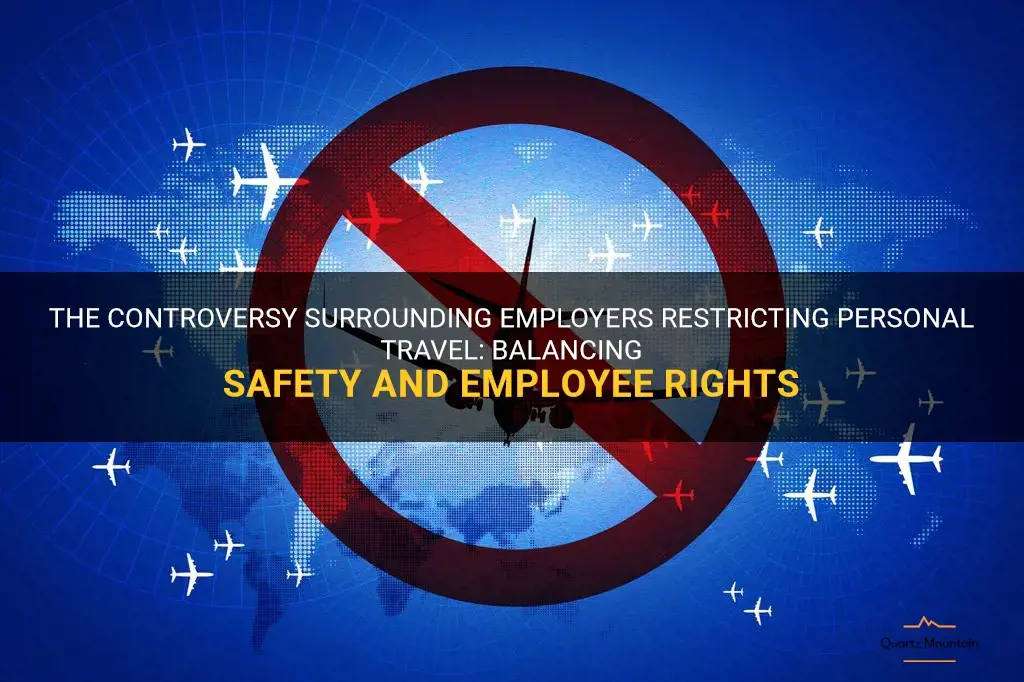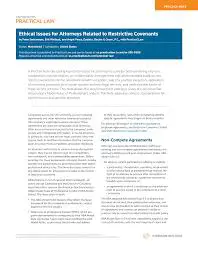
In an increasingly globalized world, where personal freedom is highly valued, it’s not uncommon for employers to enact policies that restrict their employees' personal travel. While some may argue that these policies infringe upon individual rights and limit personal growth, others believe that such restrictions are necessary to protect the company's interests and maintain a safe and productive work environment. This contentious issue raises important questions about the balance between personal freedom and corporate responsibility, as well as the potential impact of personal travel on business operations.
What You'll Learn
- Can employers legally restrict personal travel for their employees?
- Under what circumstances can employers restrict personal travel?
- What measures can employers take to enforce restrictions on personal travel?
- How do employees' rights to privacy factor into employers' ability to restrict personal travel?
- Are there any potential legal implications for employers who excessively restrict personal travel?

Can employers legally restrict personal travel for their employees?

In the wake of the COVID-19 pandemic, many employers have sought to restrict the personal travel of their employees in order to prevent the spread of the virus and protect the health and safety of their workforce. But can employers legally impose such restrictions on personal travel?
The answer to this question varies depending on the jurisdiction and the specific circumstances. In general, employers have the right to reasonably restrict employee behavior if it is necessary to protect the legitimate business interests of the company. This may include restrictions on personal travel, especially if there is a valid reason to believe that travel could increase the risk of spreading a contagious disease.
However, employers must be careful not to infringe on the rights of employees or engage in unfair or discriminatory practices. Any restrictions on personal travel should be based on legitimate business concerns and should be communicated clearly to employees. Employees should also be given the opportunity to provide input or raise concerns about the restrictions.
In some cases, employers may be required to make accommodations for employees who are unable to comply with travel restrictions due to religious or disability-related reasons. Employers should consider alternative arrangements or accommodations that can allow employees to continue working without compromising their health and safety.
Employers should also be aware that certain jurisdictions may have laws or regulations that protect employees from certain types of restrictions on personal travel. For example, in some countries, employees may have the right to privacy and freedom of movement, which could limit the ability of employers to restrict personal travel.
Additionally, employers should consider the impact of travel restrictions on their workforce and the potential legal consequences. If an employee feels that their rights have been violated or they have been treated unfairly as a result of travel restrictions, they may choose to file a complaint or even a lawsuit against the employer.
It is important for employers to carefully weigh the potential risks and benefits of restricting personal travel and to consult with legal counsel to ensure that any restrictions comply with applicable laws and regulations. Employers should also consider alternative measures, such as remote work or enhanced health and safety protocols, that can mitigate the need for strict travel restrictions.
In conclusion, while employers generally have the right to restrict personal travel if it is necessary to protect the legitimate business interests of the company, they must do so in a reasonable and fair manner. Employers should be aware of the applicable laws and regulations in their jurisdiction and should consult with legal counsel to ensure compliance. It is also important for employers to consider alternative measures that can achieve the desired goals without unnecessarily infringing on the rights of employees.
Navigating Food Restrictions and Dietary Needs While Traveling in Australia
You may want to see also

Under what circumstances can employers restrict personal travel?

With the increasing prevalence of global travel, employers may find themselves concerned about the potential risks associated with personal travel by their employees. While most employers respect their employees' right to personal freedom and privacy, there may be situations where they need to consider restrictions on personal travel.
One circumstance where employers may restrict personal travel is when there is a potential risk to the health and safety of the employee or others in the workplace. For example, if an employee plans to travel to a country with a high risk of infectious diseases or political instability, the employer may require them to postpone or cancel their trip. This is especially true if the employee's role involves frequent contact with vulnerable populations, such as healthcare workers or those working with children. In these cases, the employer may have a duty to protect both the employee and those with whom they come into contact.
Another circumstance where employers may restrict personal travel is when there is a potential risk to the employer's business interests. For example, if an employee plans to travel to a country with a high risk of corporate espionage or intellectual property theft, the employer may restrict their travel to protect sensitive information or trade secrets. This is particularly relevant in industries where proprietary information is critical, such as technology or pharmaceuticals.
Furthermore, certain industries are subject to regulatory requirements that may limit personal travel. For example, employees working in the transportation or aviation industries may be subject to restrictions on personal travel due to safety and licensing concerns. These industries are highly regulated, and employees must adhere to strict guidelines to ensure the safety of themselves and the public.
In some cases, employers may choose to implement policies that require employees to disclose their personal travel plans. This allows the employer to assess any potential risks and take appropriate measures to mitigate them. For example, the employer may require the employee to provide details about their destinations, activities, and the duration of their trip. Based on this information, the employer can make an informed decision about whether any restrictions or additional precautions are necessary.
It's important to note that any travel restrictions imposed by an employer should be reasonable and justified. Employers should consider the specific circumstances and risks involved and consult legal experts to ensure they are not infringing on employee rights or violating any laws. Employees also have a responsibility to communicate openly with their employers about their travel plans and cooperate with any reasonable restrictions that are imposed.
In conclusion, while employers generally respect their employees' right to personal freedom and privacy, there may be circumstances where travel restrictions are necessary. Factors such as health and safety risks, business interests, and regulatory requirements can all be valid reasons for employers to restrict personal travel. However, it is crucial for employers to balance these concerns with respect for employee rights and legal requirements. Open communication and collaboration between employers and employees can help ensure that any travel restrictions are fair and justified.
The Impact of Government Travel Restrictions on Tourism and Society
You may want to see also

What measures can employers take to enforce restrictions on personal travel?

In light of the ongoing COVID-19 pandemic, employers may find themselves needing to enforce restrictions on personal travel in order to keep their workforce safe and prevent the spread of the virus. While employers cannot generally restrict an employee's personal travel, they can implement measures to minimize the risk to the workplace and ensure compliance with public health guidelines. Here are some measures employers can take to enforce restrictions on personal travel:
- Communicate and educate: Employers should clearly communicate their travel policies and guidelines to employees. This includes explaining the risks associated with personal travel and highlighting the importance of adhering to public health guidelines. Provide resources such as websites or helplines where employees can access the most up-to-date information on travel restrictions and guidelines.
- Encourage virtual meetings: Where possible, employers should minimize the need for business travel by encouraging virtual meetings instead. This can help reduce the risk of exposure and limit the potential for virus transmission from travel.
- Implement quarantine requirements: Employers can require employees returning from personal travel to self-quarantine for a specified period before returning to the workplace. This can help ensure that any potential exposure is identified and contained, preventing the spread of the virus within the organization.
- Request travel disclosure: Employers can ask employees to disclose planned personal travel in advance. This allows employers to assess the potential risks associated with the destination and make informed decisions about quarantine requirements or any additional precautions that may be necessary.
- Monitor travel advisories: Employers should stay updated on travel advisories issued by relevant government authorities. This information can help inform decisions on travel restrictions and provide guidance on what measures to implement. Regularly communicate any changes or updates to employees to ensure they are aware of the current requirements.
- Provide alternative work arrangements: Employers can consider offering alternative work arrangements, such as remote work or flexible schedules, for employees who have traveled or are planning to travel. This allows employees to fulfill their work responsibilities while minimizing the risk of virus transmission in the workplace.
- Conduct regular health screenings: Employers can implement regular health screenings, such as temperature checks or symptom questionnaires, for all employees before entering the workplace. This can help identify any potential cases of COVID-19 and prevent the spread of the virus within the organization.
- Enforce consequences for non-compliance: Employers may need to enforce consequences for employees who do not comply with travel restrictions or fail to disclose personal travel. This can range from requiring employees to use paid time off for quarantine periods to implementing disciplinary actions for repeated non-compliance.
- Lead by example: Employers should lead by example and follow the same travel restrictions and guidelines they expect from their employees. This demonstrates a commitment to the health and safety of the workforce and helps establish a culture of compliance.
It is important for employers to balance the need to enforce restrictions on personal travel with respecting employees' privacy and individual rights. Employers should consult with legal counsel and review any applicable employment laws or regulations before implementing any measures. Additionally, employers should stay updated on public health guidelines and adapt their policies and measures accordingly to ensure the safety and well-being of their workforce.
Navigating the Travel Restrictions in Al Ain: What You Need to Know
You may want to see also

How do employees' rights to privacy factor into employers' ability to restrict personal travel?

In today's interconnected world, personal travel has become a common part of many employees' lives. Whether it's for vacation, family visits, or personal reasons, employees often need to travel and take time off from work. However, when it comes to restricting personal travel, employers may find themselves walking a fine line between protecting their business interests and respecting their employees' rights to privacy.
First and foremost, it's important to understand that employees, like any individuals, have a reasonable expectation of privacy. This means that they have the right to control their personal activities outside of work, including their travel plans. In general, employers cannot legally dictate where employees can or cannot travel during their time off. Restricting personal travel without a valid reason can be considered an invasion of privacy and may lead to legal consequences for the employer.
However, there are instances where employers can limit or restrict personal travel for valid reasons. One such example is when employees are required to sign confidentiality agreements or non-compete clauses as a condition of employment. In these cases, employers may have the right to restrict personal travel if they reasonably believe that the employee's travel plans could compromise the security and confidentiality of their business information. For example, if an employee plans to travel to a country known for intellectual property theft or industrial espionage, the employer may restrict or advise against such travel in order to protect their proprietary information.
Another situation where employers may have the ability to restrict personal travel is during a global pandemic or health crisis. In these cases, public health concerns and the safety of employees and the workplace can be legitimate reasons for employers to implement travel restrictions or requirements. For example, during the COVID-19 pandemic, many employers have implemented travel bans to high-risk areas or required employees to self-isolate upon their return from certain areas. These measures are put in place to prevent the spread of the virus and protect the health and safety of the workforce.
When it comes to striking a balance between employees' rights to privacy and employers' need to protect their business interests, communication is key. Employers should have clear policies in place regarding personal travel and should communicate these policies to employees in a transparent manner. It's important for employees to understand the reasons behind any restrictions and for employers to be responsive to any concerns or questions raised by their employees.
In conclusion, while employees have a right to privacy and generally cannot be restricted in their personal travel, there are valid reasons and situations where employers may have the ability to limit or restrict personal travel. This can include concerns related to confidentiality, competition, or public health. However, employers should approach these situations carefully and communicate their policies and reasons clearly to employees to maintain a healthy balance between privacy and business interests.
Understanding the Current Travel Restrictions from India to the USA
You may want to see also

Are there any potential legal implications for employers who excessively restrict personal travel?

As the world grapples with the ongoing COVID-19 pandemic, many employers have taken measures to protect their workforce and prevent the spread of the virus. This has included implementing travel restrictions and guidelines for employees. While these precautions are important, there may be potential legal implications for employers who excessively restrict personal travel.
One potential legal issue that employers may face is a violation of an employee's privacy rights. Personal travel is generally considered a private matter, and employers typically do not have the right to dictate or interfere with an employee's personal activities outside of work. If an employer excessively restricts an employee's personal travel, it could be seen as an infringement on the employee's privacy.
Additionally, excessive travel restrictions could also potentially violate an employee's rights under the Family and Medical Leave Act (FMLA). The FMLA provides eligible employees with the right to take leave for specific family and medical reasons, including caring for a family member with a serious health condition. If an employee is restricted from traveling to care for a family member who is ill or requires assistance, it could be viewed as interfering with their rights under the FMLA.
Another potential legal issue is discrimination. If an employer imposes stricter travel restrictions on certain employees based on their race, nationality, or other protected characteristics, it could be seen as discriminatory. Employers must treat all employees fairly and equally, and singling out certain employees for more restrictive travel policies could give rise to a discrimination claim.
Employers may also face legal challenges if they take adverse actions against employees for engaging in personal travel. For example, if an employer terminates or disciplines an employee solely because they traveled to a high-risk area for personal reasons, it could be seen as unlawful retaliation. Employees have the right to engage in lawful activities outside of work, and terminating or disciplining them for personal travel alone may be considered retaliatory.
To mitigate these potential legal implications, employers should ensure that any travel restrictions put in place are reasonable, necessary, and in compliance with applicable laws and regulations. Employers should also consider implementing flexible policies that allow for exceptions in cases of emergency or essential travel.
It is important for employers to consult with legal counsel and stay updated on federal, state, and local regulations regarding travel restrictions and their potential legal implications. By doing so, employers can strike a balance between protecting their workforce and avoiding potential legal pitfalls.
Stay Up-to-Date: Are There Any Travel Restrictions to St. Lucia?
You may want to see also
Frequently asked questions
Yes, in certain circumstances, an employer may have the legal authority to restrict personal travel of their employees. This is especially true during times of emergencies or when there are specific security concerns that could potentially affect the company or its employees.
Some common reasons an employer may choose to restrict personal travel include concerns about potential exposure to contagious diseases, political unrest or terrorism, or travel to countries under travel advisories. Similarly, employers may restrict personal travel if it poses a conflict of interest or has the potential to negatively impact an employee's ability to perform their job duties.
Yes, there are some legal limitations to an employer's ability to restrict personal travel. These limitations generally depend on the jurisdiction and the specific circumstances. For example, in some countries, employees may have certain rights to privacy and freedom of movement that could limit an employer's ability to restrict personal travel unless it directly impacts the company or its operations.
Employers should communicate personal travel restrictions clearly and effectively to their employees. This includes providing a rationale for the travel restrictions and outlining any consequences for non-compliance. Employers should also be mindful of any legal requirements or employee rights when enforcing travel restrictions, and should consider offering alternative work arrangements, such as remote work or paid leave, if feasible. It is important for employers to regularly review and update their travel policies and restrictions as the situation changes, and to consult with legal counsel if there are any questions or concerns about the legality or enforceability of the restrictions.







